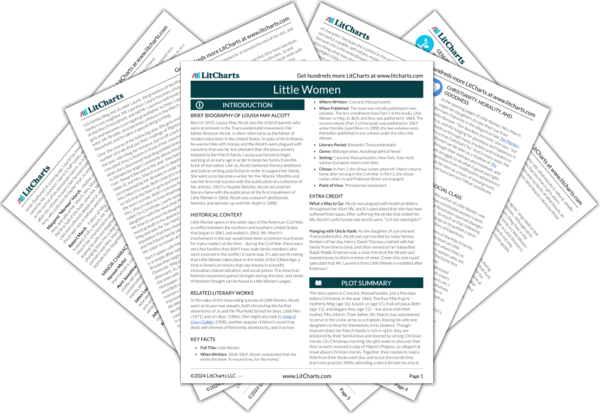Summary
Analysis
The day before the Chesters’ fair, as they set up the tables, Amy is snubbed by Mrs. Chester and her daughter May, because May is envious of Amy. Mrs. Chester has Amy change her station from the art table (for which Amy had prepared a number of beautiful handmade items) to the flower table (located near the back of the fair). Amy is hurt, and sweeps the artworks she had made for the fair off of the table. She resolves to be kind to the Chesters, regardless of her anger. “Because they are mean is no reason why I should be,” she tells Mrs. March. Her mother agrees that this is the right course of action.
Amy is worthy of envy because she has good breeding, has artistic talent, and is good looking. Her ability to navigate between social classes means that she presents a genuine threat to the likes of a wealthy girl like May Chester. It’s fitting that Amy should be relegated to the flower table, as flowers in Little Women signify true, genuine beauty. Amy’s decision to turn the other cheek is clearly Christian.
Themes
Quiz
Test Yourself
The day of the fair, Amy spies an entry in an old book that she had been illuminating: “Thou shalt love thy neighbor as thyself.” Amy realizes that she shouldn’t hold a grudge against the Chesters, and returns her artworks to the art table. Amy spends a long, disappointing day at the flower table – many of her flowers wilt, and she sells few things. After supper, however, the tide turns: Laurie sends in a new shipment of flowers from his conservatory, and brings a group of his college chums to the fair to buy Amy’s wares.
Amy again turns the other cheek, a Christian act. Her virtue, and the suffering she endures as a result of it, doesn’t go unnoticed: she is rewarded by male attention (something that May Chester no doubt envies). The fact that she’s selling flowers echoes all other instances of flowers in Little Women: she is dealing in good, wholesome, simple things.
Themes
Quiz
Test Yourself
One week later, Amy is rewarded for her selfless, ladylike behavior. Aunt Carrol sends word that she wishes to take Amy with her on a trip to Europe. Jo is devastated – she was sure that Aunt Carrol would pick her. Mrs. March explains that Jo was passed over due to her “blunt manners and too independent spirit.”
Amy is essentially rewarded for being more ladylike than Jo. Jo recognizes that there are consequences for women who don’t live their lives according to the dictates of a patriarchal society.
Themes
Literary Devices
Quiz
Test Yourself
Amy packs her things and leaves for Europe soon after. Before she leaves, Amy reminds Jo that this isn’t “a pleasure trip” for her, given that she hopes to seriously study art while in Rome. Laurie sees Amy off at the docks, and promises her that he will go to Europe and comfort her if anything bad should happen back home.
Amy seems to believe she deserves this trip more than Jo, given that it represents more opportunities to make wealthy connections (connections that Jo would ruin). Laurie’s tenderness toward Amy foreshadows later events.
Themes
Quiz
Test Yourself
Get the entire Little Women LitChart as a printable PDF.













